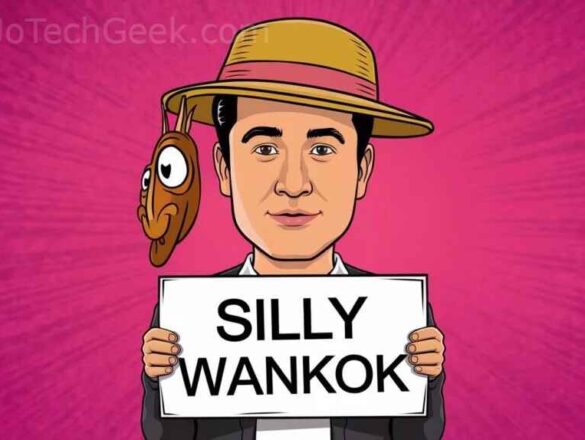Introduction
In today’s world, where the internet dictates a significant portion of our daily interactions, the emergence of unique online personalities and terms has silly wankok become the norm.
One such term that has caught the attention of netizens is Silly Wankok. While it may sound unfamiliar or even nonsensical to many, Silly Wankok has slowly made its way into the lexicon of internet culture.
This article aims to explore the meaning, origins, and growing popularity of Silly Wankok, all while delivering a fun, user-friendly, and detailed analysis of the phenomenon.
In this comprehensive gudei, we will break silly wankok down the significance of the term, its cultural relevance, and how it has found its way into memes, social media conversations, and even the language of modern-day humor.
We will also examine why it continues to fascinate internet users and the role it plays in the creation of new internet slang.
So, let’s dive into the quirky world of Silly Wankok and see what makes it tick.
What is Silly Wankok?
Silly Wankok is a term that, at first glance, may appear as a jumble of random words. However, it is an amalgamation of two separate elements that combine to form an oddly humorous and sometimes absurd concept in online spaces.
The silly wankok word “Silly” is straightforward in its meaning, denoting something playful, goofy, or nonsensical.
On the other hand, “Wankok” is a more obscure term, which seems to be a play on the slang “wank,” commonly used in British English to refer to an activity of self-pleasure, often associated with mockery or insult in some contexts.
When combined, Silly Wankok is often used in silly wankok social media, forums, and meme circles to describe something light-hearted, ridiculous, or simply absurd.
It’s not necessarily a negative term, but rather one that pokes fun at the nature of modern-day humor, which often thrives on randomness and exaggerated absurdity.
The Origins of Silly Wankok

Like many terms in internet culture, Silly Wankok doesn’t have a clearly defined origin. It has evolved through memes, text conversations, and comedic skits shared across platforms like Twitter, Reddit, and TikTok.
Many language experts argue that modern slang is often shaped by a variety of cultural influences, including regional dialects, viral trends, and the collective creativity of internet users.
What sets Silly Wankok apart is its reliance on the unexpected combination of two contrasting words.
While “Silly” is often associated with childlike innocence, “Wankok” draws from a more edgy and somewhat crude lexicon, leading to a blend of playful absurdity and satirical humor.
Why Silly Wankok Resonates with Internet Culture
One of the key reasons why Silly Wankok has gained popularity is its embodiment of the randomness and spontaneity that are characteristic of modern internet culture.
Internet memes and trends often thrive on the absurd, the unpredictable, and the unexpected. By merging an innocent term like Silly with something as unexpected as Wankok, the phrase plays into the humor of confusion and surprise.
This kind of humor has become a defining feature of meme culture, which thrives on blending incongruity with a sense of playfulness.
Moreover, the term’s ambiguous and non-serious nature allows it to be used in a wide variety of contexts. Whether it’s in response to a bizarre comment on Reddit, a quirky video on TikTok, or a playful post on Twitter, Silly Wankok can be inserted as a humorous reaction or a way to mock the situation in an exaggerated, nonsensical manner.
This versatility is one of the reasons why it has become a beloved phrase for those who engage with meme culture.
How Silly Wankok Has Found Its Place in Social Media
Social media platforms are the breeding grounds for many internet trends, and Silly Wankok is no exception. Platforms like Reddit and Twitter have long been hubs for people to share inside jokes and create viral content.
The phrase quickly took off as users started incorporating it into their posts and replies, generating laughter with its random, almost absurdist humor.
On Reddit, for example, users often post Silly Wankok in response to particularly bizarre or unexpected content.
The term’s quirky nature fits well within the context of subreddits dedicated to humor, such as r/memes or r/funny. Similarly, on platforms like TikTok, users create short videos incorporating Silly Wankok either as a hashtag or part of a comedic skit, often playing with the phrase’s absurdity to generate laughs.
Examples of Silly Wankok in Internet Memes
To understand the popularity of Silly Wankok, let’s look at how it manifests in meme culture. Here are a few typical examples of how the term might be used: Meme Reaction Image: A classic meme format often involves an image of a ridiculous or over-the-top facial expression paired with a humorous caption.
The caption could read something like, “When you realize the cake you’ve been waiting for is just a box of Silly Wankok,” poking fun at the exaggerated reaction to an anticlimactic outcome.
Twitter Posts: Someone might tweet something like, “Just saw a cat wearing sunglasses and eating pizza.
Truly the Silly Wankok era has begun,” humorously attributing the rise of outlandish, meme-like behavior to an entire “era.”TikTok Challenge: A viral TikTok might involve a group of people doing an exaggerated, absurd dance to a random song while shouting “Silly Wankok!” at intervals, just for comedic effect.
In all these examples, Silly Wankok works because it’s unexpected, random, and taps into the kind of humor that thrives on social media today absurd, fast-paced, and designed for quick laughs.
The Cultural Impact of Silly Wankok
While Silly Wankok may seem like just a fad, it speaks to larger trends in the evolution of internet humor.
The digital age has shifted the way we engage with language, pushing us toward creating and adopting phrases that are spontaneous and often non-linear. The absurdity of Silly Wankok is part of this shift.
Furthermore, phrases like Silly Wankok also point to how humor has become democratized. In the past, traditional comedy followed structured formats with punchlines and setups.
Today, however, anyone can create a meme or a phrase that resonates with the masses, regardless of their background or comedic experience. This sense of inclusion and creative freedom is a hallmark of internet humor, where even the most bizarre terms can become culturally significant.
Conclusion

In conclusion, Silly Wankok is a prime example of how modern internet humor has evolved into something spontaneous, unpredictable, and delightfully absurd.
The term may have started as a playful combination of two contrasting words, but it has since become a central figure in meme culture, encapsulating the randomness and irreverence that define the internet’s approach to humor.
As social media platforms continue to shape the way we interact and communicate, we can expect more quirky phrases like Silly Wankok to emerge, making their way into our everyday conversations and adding a touch of light-hearted absurdity to our digital lives.
FAQs
1. What does Silly Wankok mean?
Silly Wankok is a term that combines the word “silly,” meaning playful or goofy, with “wankok,” which is a playful variation of the British slang “wank.” It is used to describe something absurd, funny, or light-hearted in internet culture.
2. Why has Silly Wankok become popular?
The popularity of Silly Wankok can be attributed to its random, absurd, and humorous nature. It fits well with the meme culture that thrives on spontaneity and unexpected humor. The phrase’s versatility makes it perfect for various internet contexts, including memes, social media posts, and videos.
3. Can I use Silly Wankok in my social media posts?
Absolutely! Silly Wankok is a fun and playful term that is commonly used in online conversations. Whether you’re responding to something absurd or just looking to add humor to your post, it’s a great phrase to use.
4. What platforms use Silly Wankok the most?
Silly Wankok is primarily used on platforms like Reddit, Twitter, and TikTok. It is particularly popular in meme-centric subreddits, humorous Twitter threads, and viral TikTok videos where absurdity is celebrated.
5. Is Silly Wankok a fad or here to stay?
While it’s hard to predict, the growing trend of using absurd phrases in internet humor suggests that terms like Silly Wankok will continue to evolve and remain part of the broader meme culture for the foreseeable future




